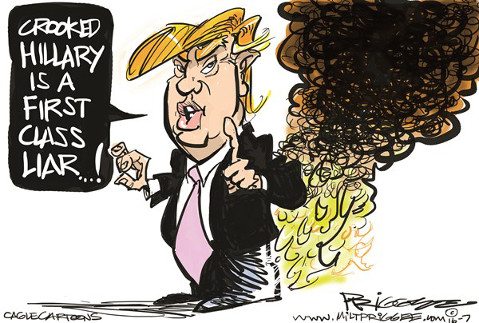The Bully Pulpit Gone Mad
Defying the Rules as Well as Reality

Outrageous-speak by the Republican nominee has been out of control for weeks. Like an orator possessed, Donald Trump is clearly afflicted. But how?
“Liar” has been the operative term until now. Responsible journalism has been redefined, and many journalists are using the “L word” liberally. Chanting “Liar, liar, pants on fire,” the New York Times published its “Week of Whoppers” reporting that Trump “ … unleashed a blizzard of falsehoods … and outright lies … ” In Politico’s lie detector survey, he averaged one lie every three minutes plus. Now, it seems, Trump is being called a liar every three minutes.
Word has also insinuated deed — “Maybe the 2nd Amendment people can do something about it” — including ironically, “I am a gentleman,” as Trump declared as he shadowed Hillary Clinton during the Town Hall, evoking the recent (gallant?) comments about assaulting women. It was the “bully pulpit” redefined and while the press took note, the liar moniker prevailed. The Daily Beast called Trump a “cartoon bully” while the New York Times listed 20 topics on which he had lied then referenced a 21st, “He just lies.” If only lying were the problem.
In a world accustomed to artifice — reality TV, newsroom spin — and violence, Trump incites. Of course. But why, exactly? Because his lies are “whoppers”? He lies, then lies about the lie like a brick wall denying bricks? He’s a bully? Unpresidential? Maybe it’s something more.
In 1986, the philosopher Harry Frankfurt wrote a best-seller titled On Bullshit that defined the “spin” to which the public and press had become acculturated. In falsifying, the liar paradoxically acknowledges truth. Bullshit has no relation to truth. The bullshit-talker only cares about the impression he is making. Frankfurt’s analysis has been a guide for communications for over 30 years. But Trumpisms are way out Frankfurt’s liar’s/bullshitter’s league. Hence, incensed journalists calling out the foul hot air of gas-lighting.
Trump has been diagnosed repeatedly from afar, a practice that is unethical if engaged in by a clinician. Again, professionalism has been redefined, and clinicians have been setting forth in floods the idea that he is a narcissist. Psychologist George Simon stated that Trump personifies the diagnosis, adding, “He’s a dream come true.” However, all narcissists are not created equal. In a seminal work, the psychoanalyst Otto Kernberg developed a diagnostic ladder system of severity in which narcissism can be horizontally graded from least to most disturbed. The “borderline” narcissist is the most impaired and is subject to psychotic features such as lapses into delusion, particularly of a grandiose nature. “I, alone, can fix it.” This is not just a lie, nor is it bullshit. It’s lunacy. “Obama and Hillary founded ISIS.” Is this reality or irreality TV? As David Brooks commented, this is a “condition”.
An ominous condition. The psychoanalyst Erich Fromm described the malignant narcissist as someone who, out of a profound sense of inadequacy, coupled with equally profound envy and rage is not only delusional but also nefarious. Whether cult leader or politician, demagogues are drawn from these ranks and are out to destroy. Deluded and lawless, if given power, this narcissist is dangerous.
From a psychological perspective, Trump is not running for president, he is out for self-aggrandizement on a prodigious scale. He is delusional, grandiose — and angry. He is not campaigning, he is trashing. He is not lying or bullshitting, he is making a mockery. He is uncivil to the point of criminal.
His real message is that he can defy the rules as well as reality and say or do anything — “When you’re a star … you can do anything” — without consequence. “I could shoot somebody, and I wouldn’t lose any voters.” He is “smart” to evade taxes. He can devolve to speaking in tongues during the first presidential debate, declare himself the winner then turn against his staff for telling him otherwise. He can turn on his opponent, too: She could be jailed or shot. Trump does not want to govern; he wants to dictate, and he wants to dictate reality. Does he want to make America great again or take it down in a megalomaniacal fit?
In terms of discourse, conduct, and law, Trump is noncompliant. To entertain him at the level of “lying” or “bullying” is to assuage. Was Hitler lying? Did he need fact-checking? Was he a bully? This is what decent people do when confronted with the snide remarker, the snark, at a dinner party. They maintain a modicum of denial as well as decorum; they appease. This is exactly what happened in the 1930s — Appeasement. Trump’s behavior is being challenged, but it must also be identified. He is no cartoon bully, he is real and he’s not funny. Defining Trump’s behavior as anything but threatening, anything but a condition is deficient. The press must let the electorate know.
Elizabeth Berlese is a clinical psychologist and psychoanalyst who practices and writes in Santa Barbara.



